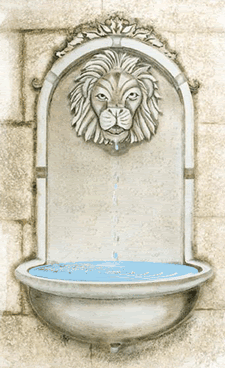Goodness
 Good is hard to preserve: but it is also terribly hard to eradicate completely. As Professor Powicke says, "In all ages there have been civilized persons." As Williams said to me in Addison's Walk, talking of the invasion of Norway, "And yet, even there, at this moment, people are falling in love."
Good is hard to preserve: but it is also terribly hard to eradicate completely. As Professor Powicke says, "In all ages there have been civilized persons." As Williams said to me in Addison's Walk, talking of the invasion of Norway, "And yet, even there, at this moment, people are falling in love."~C.S. Lewis, Taliessin Through Logres, ...Arthurian Torso, "Williams and the Arthuriad", (1948)
We do not really know what it feels like to be a man much better than ourselves. His whole inner landscape is one we have never seen, and when we guess it we blunder. It is in their "good" characters that novelists make, unawares, the most shocking self-revelations. Heaven understands Hell and Hell does not understand Heaven, and all of us, in our measure, share the Satanic, or at least the Napoleonic, blindness. To project ourselves into a wicked character, we have only to stop doing something, and something that we are already tired of doing; to project ourselves into a good one we have to do what we cannot and become what we are not.
~C.S. Lewis, A Preface to "Paradise Lost", (1942)
________________________
Link #1 of the day: Tolkien's Oxford (a photographic slide show)
Link #2 of the day: Learn more about the invasion of Norway in 1940




4 Comment(s):
I'd never thought of that (the second excerpt) before. I wonder then if Lewis thought certain writers were nearly saint-like simply because of their crafting of "good" characters? Or would one be able to tell, since being ourselves so short of sainthood, we may not recognise the innner workings of a saint accurately set down on the page?
On a side note, I find it interesting that Napolean comes in for the kind of criticism that Hitler receives today. That is to say, when one needs an example of an evil man upon which everyone agrees, today Hitler is most often chosen. But I've never really thought of Napolean as being one of the most evil men in history. Perhaps I simply don't know enough about him.
But is he saying Napoleon was evil, or just blind to his own faults?
Somewhere I need to find the quotation where Lewis is talking about writing The Screwtape Letters. He said that thinking and writing in that evil frame of mind was exhausting, and he couldn't stand to do it for long. Here, he seems to be saying it should be relatively easy to do.
I noticed the reference to Napolean as well. There was a time when the English regarded him as every bit as bad as we think of Hitler now. Jane Austen's novels were written during the Napoleanic wars when there was constant threat of invasion and she regularly refers to him as a 'monster' etc. Although he didn't do concentation camps, his wars killed lots of people. I suspect that before Hitler the English regularly picked him as the 'most evil'.
But isn't it then this blindness to our faults, or perhaps our blindness to our lack of virtue, that causes us to persist in sin and to sin all the more greatly? And if Lewis uses Napoleon as merely one step down from Satan, surely this indicates a distinct belief in the evil of Napoleon?
Post a Comment
<< Home